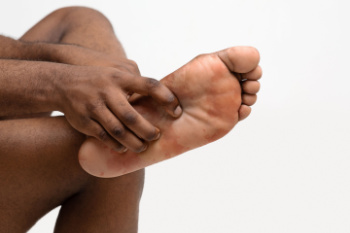
The Achilles tendon, located at the back of the ankle, connects the calf muscles to the heel bone. It plays an important role in walking, running, and jumping, bearing the brunt of physical activity. The tendon has a relatively poor blood supply, making it more susceptible to injury and slower to heal. An Achilles tendon rupture occurs when the tendon tears, often during sudden, forceful movements like jumping or sprinting. This injury is most common in men aged 30 to 50, especially those who engage in intense physical activity without adequate warm-up. Symptoms include a sudden, sharp pain in the back of the ankle, often accompanied by a popping sound, followed by difficulty walking. While similar pain might be due to conditions like bursitis, a rupture is more serious. If untreated, it can lead to long-term disability. Diagnosis typically involves a physical exam and imaging tests. Treatment options range from immobilization with a cast to surgical repair, depending on the severity of the rupture. If you have sustained a painful injury to your Achilles tendon, it is strongly suggested that you visit a podiatrist as quickly as possible for a proper diagnosis and appropriate treatment methods.
Achilles tendon injuries need immediate attention to avoid future complications. If you have any concerns, contact one of our podiatrists of Illinois . Our doctors can provide the care you need to keep you pain-free and on your feet.
What Is the Achilles Tendon?
The Achilles tendon is a tendon that connects the lower leg muscles and calf to the heel of the foot. It is the strongest tendon in the human body and is essential for making movement possible. Because this tendon is such an integral part of the body, any injuries to it can create immense difficulties and should immediately be presented to a doctor.
What Are the Symptoms of an Achilles Tendon Injury?
There are various types of injuries that can affect the Achilles tendon. The two most common injuries are Achilles tendinitis and ruptures of the tendon.
Achilles Tendinitis Symptoms
- Inflammation
- Dull to severe pain
- Increased blood flow to the tendon
- Thickening of the tendon
Rupture Symptoms
- Extreme pain and swelling in the foot
- Total immobility
Treatment and Prevention
Achilles tendon injuries are diagnosed by a thorough physical evaluation, which can include an MRI. Treatment involves rest, physical therapy, and in some cases, surgery. However, various preventative measures can be taken to avoid these injuries, such as:
- Thorough stretching of the tendon before and after exercise
- Strengthening exercises like calf raises, squats, leg curls, leg extensions, leg raises, lunges, and leg presses
If you have any questions please feel free to contact our offices located in Wheeling and Berwyn, IL . We offer the newest diagnostic tools and technology to treat your foot and ankle needs.



 Plantar fasciitis
Plantar fasciitis